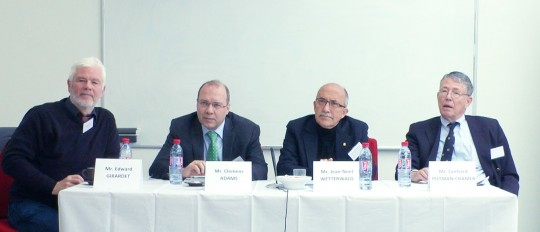

On February 25th, 2014, Geneva Business News and UBIS University held the first meeting from the Breakfast Series on Trends in the Job Market at the UBIS campus on avenue Blanc in Geneva.
Three panelists and a moderator, with combined humanitarian experience of over 100 years, delivered animated presentations and held a question and answer session with 45 participants interested in learning more about working for International Organizations.
Moderated by Edward Girardet, Editor of le News and experienced humanitarian journalist, the panel included:
Mr. Clemens Adams began by speaking about his own experience with entering the UN system. He highlighted the importance of being willing to work in the field before applying for positions in locations like Geneva or New York.
He also mentioned that a first experience working for an NGO is a good option for those looking for field work before entering applying for a UN job. He also touched on why people from some countries have more of a chance of obtaining a position at the UN than others, explaining that countries who have less representation within the UN have more of a chance than those who are over-represented.
Jean-Noel Wetterwald then gave his own point of view on what it takes to be recruited based on his own experiences. In an entertaining way, but very concisely, Mr. Wetterwald summarized the best application profile with the acronym AETLL+ :
The “+” refers to additional factors that the UN takes into consideration, such as gender or country representation.
Mr. Wetterwald highlighted the importance of being sure of what one really wants, having a strategy, and following through. He also suggested applying to programs such as the UN Volunteer (UNV) program, which gives successful applicants the opportunity to work for 2 years as a volunteer and can be helpful as a first step to entering the UN.
The last presentation before questions were taken was made by Mr. Gerhard Putman-Cramer, who talked about common mistakes which people make when they apply for positions at International Organizations. The first mistake echoed Mr. Adams’ advice against trying to start at the headquarters in Geneva, New York, Vienna or Nairobi, which have fewer relative positions and more limitations than field offices. He also stressed the importance of applying for positions for which one is qualified, not simply because one wants to work in one agency or another.
Mr. Putman-Cramer stressed that experience working in a multicultural environment is important for recruitment at the UN, even if an applicant does not have field experience. He finished by insisting that International Organization are open to employing people from the private sectors who have transferable or useful skills and experience.
After these presentations, Mr. Girardet animated the question and answer session. Questions focused mainly on specifics of what makes a good application, or specific situations such as how a working mother or person with only volunteer experience could improve their chances of obtaining a position in an International Organization.
In the conclusion, all panelists agreed that the most important elements of an application remain:
All of the panelists acknowledged that applying to International Organizations can be challenging and time consuming, but they encouraged people to persevere.
Participants came out of the meeting feeling like they had gained some important advice on how to improve their chances. One participant commented that while “…they did not show us or tell us which door to knock on for direct and immediate access to employment at the UN, they did give us hope…”.